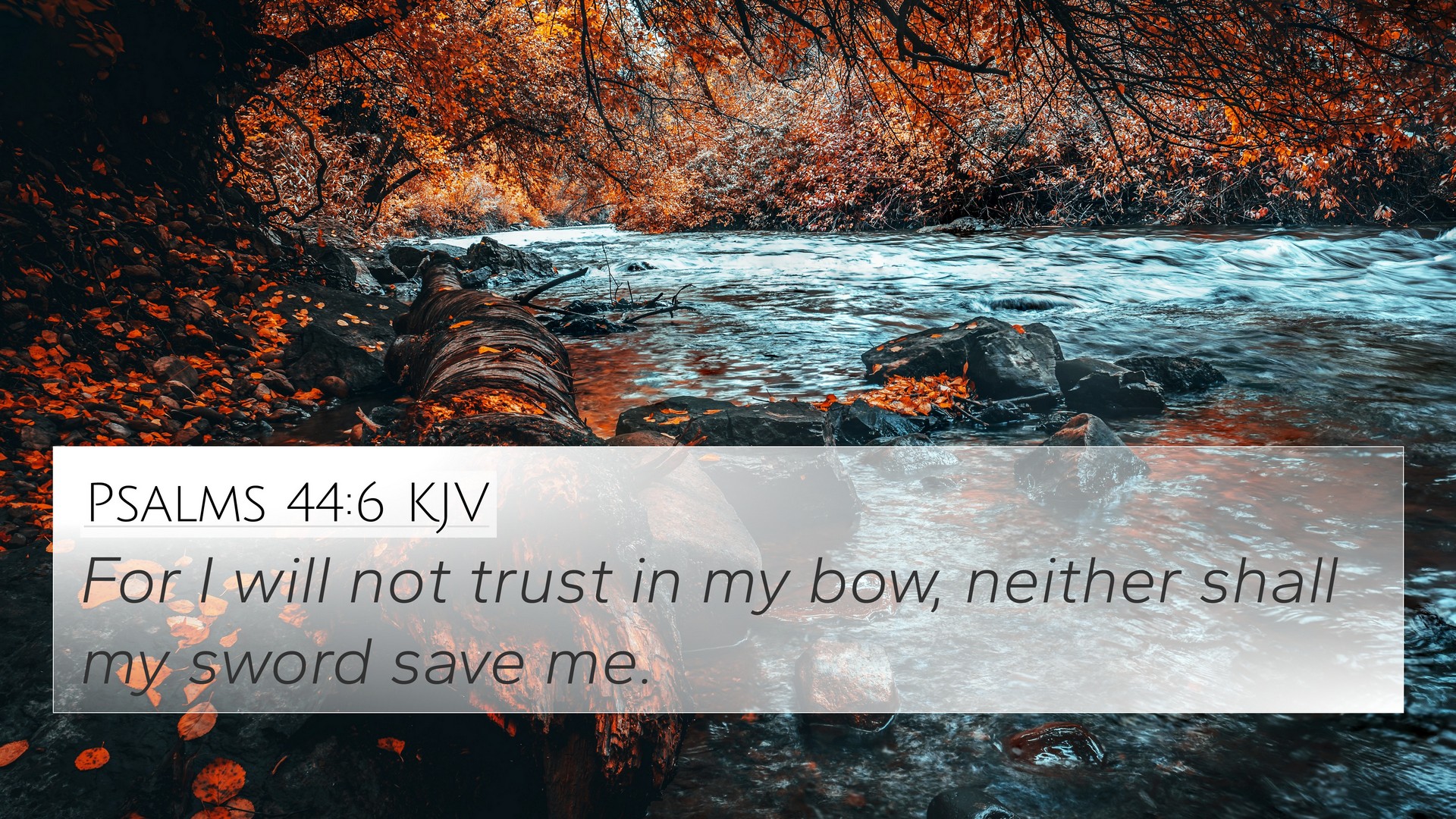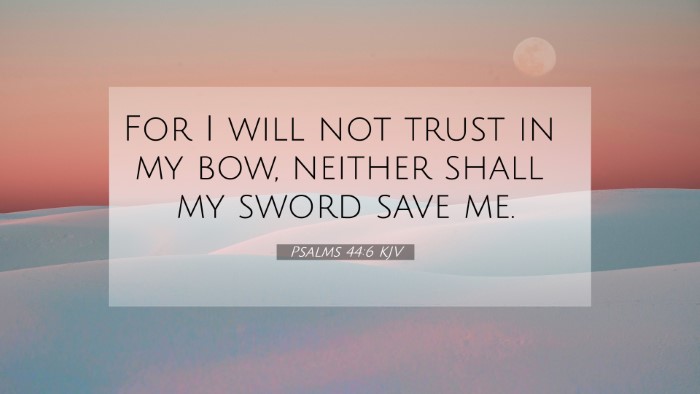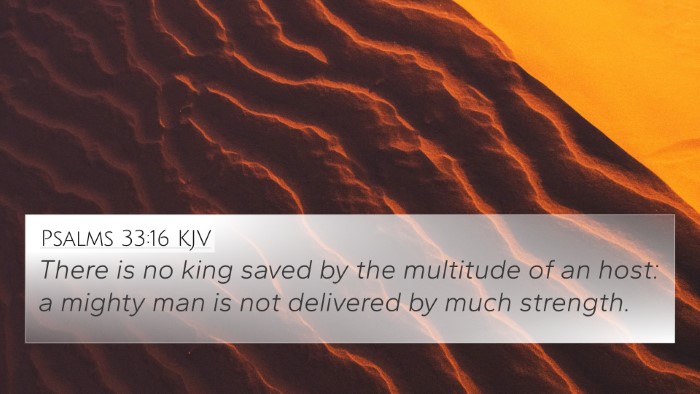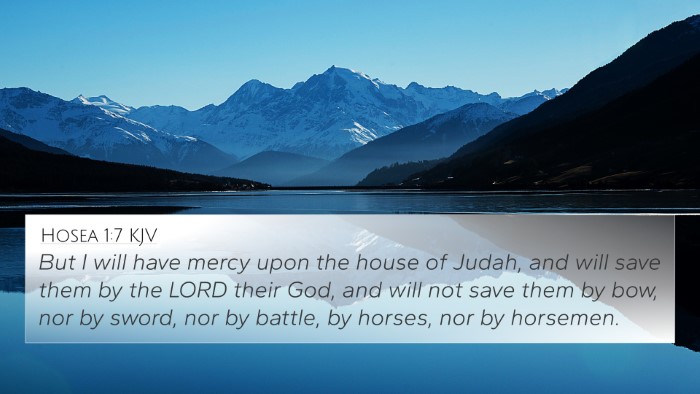Psalms 44:6 - Summary and Interpretation
Psalms 44:6: "For I will not trust in my bow, neither shall my sword save me."
Overview of Psalms 44:6
This verse emphasizes a profound declaration of trust in God rather than in military strength or human weapons. The psalmist reflects on the futility of reliance on one's own capabilities and worldly means, calling for a deeper faith in divine power and providence.
Insights from Public Domain Commentaries
Matthew Henry's Commentary
Matthew Henry notes that the psalmist's declaration serves to express a conscious reliance on God amidst adversities. The phrase indicates a rejection of self-confidence, highlighting the importance of divine intervention over human resources. Henry underlines that true strength lies not in physical abilities but in faith that trusts in God's saving power.
Albert Barnes' Commentary
Albert Barnes elaborates on the significance of this verse by emphasizing that God’s assistance cannot be substituted with human efforts. He states that the psalmist recognizes a spiritual truth where physical weapons are inadequate to procure victory. Barnes stresses that the focus should be on God's faithfulness rather than our own might, reinforcing the need for divine reliance in the face of challenges.
Adam Clarke's Commentary
Adam Clarke highlights that the verse conveys a profound expression of humility. It calls attention to the fact that bow and sword—symbols of military might—are ultimately powerless without God’s blessing. Clarke proposes that the psalmist is in a moment of distress, reflecting on previous victories granted by God alone, thus drawing a connection between past mercies and current trials.
Thematic Connections and Cross-References
The themes of reliance on God and the rejection of self-reliance can be found throughout the Bible. Below are cross-references that resonate with the message of Psalms 44:6:
- Proverbs 21:31: "The horse is prepared for the day of battle, but victory belongs to the Lord." - This reinforces the notion that divine sovereignty prevails over human preparations.
- Isaiah 31:1: "Woe to those who go down to Egypt for help, who rely on horses and trust in chariots because they are many, and in horsemen because they are very strong; but do not look to the Holy One of Israel, or seek the Lord!" - A warning against misplaced trust in worldly resources.
- Psalms 20:7: "Some trust in chariots, and some in horses; but we will remember the name of the Lord our God." - A direct parallel to the themes of trust in divine power over earthly means.
- Psalms 147:10-11: "His delight is not in the strength of the horse, nor his pleasure in the legs of a man; but the Lord takes pleasure in those who fear him, in those who hope in his steadfast love." - Here, reliance on physical might is contrasted with a heart that fears and hopes in God.
- 2 Corinthians 10:3-5: "For though we walk in the flesh, we do not war according to the flesh. For the weapons of our warfare are not carnal but mighty in God for pulling down strongholds." - This teaches that spiritual battles require spiritual tools rather than reliance on human strength.
- Romans 8:31: "What then shall we say to these things? If God is for us, who can be against us?" - A profound declaration that emphasizes divine support over human efforts.
- Ephesians 6:10: "Finally, my brethren, be strong in the Lord and in the power of his might." - Encouragement to find strength not in ourselves but in God's might.
- Psalms 60:11: "Give us help from trouble: for vain is the help of man." - Asserts that human help is ultimately ineffective compared to God's assistance.
- Hebrews 11:34: "Quenched the violence of fire, escaped the edge of the sword..." - A reflection of God's deliverance where physical weaponry falls short.
Conclusion
In summary, Psalms 44:6 serves as a profound reminder of the necessity to place unrestricted trust in God as the source of strength and salvation. The interconnectedness of this verse with other scriptures emphasizes the theme of faith over reliance on physical resources, providing a rich context for understanding God's intentions in both the Old and New Testaments. For anyone engaging in a comparative Bible verse analysis, the insights derived from this psalm remind us of the overarching narrative of divine reliance throughout Scripture.
SEO Keywords Integration
In studying bible verse cross-references, we find that connections between Bible verses can illuminate the message within this specific scripture. By examining linking Bible scriptures such as Isaiah 31:1 and Psalms 20:7, readers can appreciate how these texts relate thematically. Tools for bible cross-referencing and methods for cross-reference Bible study are invaluable for those seeking deeper understanding.






